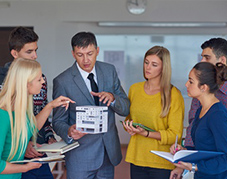
Starting at Sheffield Hallam
Module 3: Adapting to higher education
Screen challenge: Will any of the learning settings at university or college be new to you?
What can you do to prepare for this experience?
In higher education, the ways you are taught and the ways you learn differ from other types of education you may have encountered. So whether you have come straight from secondary/high school or are returning to studying after time away, it will take some time to adjust.
In the activity below, click 'Next' to move through the book and learn more about different types of learning settings. Be aware that the terms for different settings may vary across institutions and disciplines. Check your institution's or department's website for more information.
Lectures

Lectures are used to present information. These may be held in a hall with a large number of students, in smaller rooms or recorded online. A lecture introduces specific topics or issues, and afterwards you are expected to explore the topic in more detail during independent study time. Lecture content often comes up for discussion in tutorials or seminars.
Seminars

Seminars typically involve smaller numbers of students than lectures and may take place in person or online. The aim of a seminar is to discuss a topic in detail; you analyse, consider evidence and make arguments. Seminars generally have a more relaxed atmosphere than lectures, and you are encouraged to discuss your reactions to a particular subject.
Tutorials

Tutorials are typically very small meetings, sometimes one-to-one between you and a lecturer, where you discuss a particular piece of work. These sessions give you the opportunity to gain advice on the form and content of your assessment, and help academic staff provide personal feedback on your progress.
Laboratories and practicals

Laboratories, studio time and practicals are activities designed for certain subject areas where you do hands-on experiments or other work dealing with the practical applications of what you have learned in lectures, tutorials or seminars.
Independent study

Independent study is an essential activity for all students. You are expected to set aside time to read and think around the subjects you are studying. You are expected to research a wide range of sources in order to inform your thinking. In addition, you need to prepare for lectures, tutorials and seminars to gain the most from them.
Peer study sessions

Peer study sessions can be organised by your lecturer or conducted informally in person or online. They generally involve a small group of students, and offer an opportunity to discuss topics and ask questions in a friendly, casual environment. They can be a great place to make friends and work on your subject confidence.
Proactive engagement

If you have questions during any type of learning session, don't be afraid to ask questions in front of your peers. Chances are, many of them are facing the same challenges and are wondering the same thing!
In the following video, students and staff talk about the differences between secondary school and higher education and give advice on how to adjust. Click 'Play' to watch the video.
Portfolio activity
Duration: 10 minutes
Think about a topic that interests you in your subject area – anything from a computer programme or ancient Greek myth to a business case study or a musical composition. Write down a few points for the questions below.
- What could you gain from a lecture, a tutorial and a practical session that would help you with an assignment on this topic?
- How else would you need to spend your time to complete an assignment?
You may wish to download and use the attached template to record your thoughts.
Adapting to higher education
Useful advice
Why don't I just go to class five days a week like last year?
Universities and colleges have many purposes and cover a wide range of fields and disciplines. Having different types of classes throughout the week allows you to be taught by academics in different subjects. Giving you time away from formal learning gives academics (and you!) time to do research and independent study.
Why have the forms of assessment changed? What's wrong with a simple exam?
At your institution, you may encounter new forms of assessment, from group projects or presentations to laboratory skills tests. Each form of assessment tests a different skill – and helps you develop the skills you will need in your subject area.
If you are struggling with any aspect of your education – or worried about your marks – there is plenty of support available to help you, both on campus and online. Most students are amazed at the amount and variety of support on offer and wish they'd asked for help sooner!
Some of the help available includes:
- Study support centres
- Workshops and training sessions
- Study advisors
- Peers in your subject area
- Student services.
If you are an international student or if you have a disability or learning difficulty such as dyslexia or dyspraxia, there will be services tailored to suit your specific needs. One in five university and college students experience some form of mental health issue during their studies (NUS, 2013). If you have a mental health problem, counselling and mental health services can really help, particularly if you seek help early.
On the screen 'Independent learning' we will look at a key part of higher education: taking charge of your own learning.
Useful advice
If you think you have chosen the wrong subject area, don't suffer in silence. Ask someone for advice. Student services may be able to help you transfer to other schools of study at your institution.
 I was a lot more stressed during my A-levels than I am now. Maybe it's because I'm not living at home with my parents badgering me all the time about whether I've finished my work. Also, I live very close to the library and it's open 24 hours. I've learned to budget my time on my own.
I was a lot more stressed during my A-levels than I am now. Maybe it's because I'm not living at home with my parents badgering me all the time about whether I've finished my work. Also, I live very close to the library and it's open 24 hours. I've learned to budget my time on my own.
